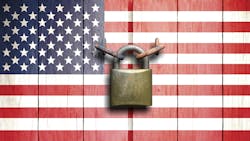How Will the Government Shutdown Affect Workplace Safety?
With neither party willing to give an inch, the US Congress has reached an impasse that will cause the federal government to effectively shut down many of its services. The immediate result will be the furloughing of roughly 750,000 federal employees, which includes employees of the Labor Department’s Occupational Safety and Health Administration (OSHA).
According to a briefing provided by law firm Fisher Phillips, OSHA is expected to be “heavily impacted by the shutdown.” Pointing to previous shutdowns as precedent, Fisher Phillips notes that nearly 90% of OSHA employees were furloughed in the past, leaving just area directors and assistant area directors to do most of the work. “We expect to see OSHA only opening up between 15-20% of the number of inspections that would normally occur during any shutdown if history is any guide,” the law firm stated in its briefing.
Inspections will be severely curtailed, other than those for “workplace fatalities, catastrophes and imminent danger situations.” Since state OSHAs receive significant funding from federal OSHA, their operations will also be impacted.
In its briefing, lawfirm Littler explains that the impact of the shutdown “could be substantial for those employers navigating a federal OSHA enforcement action or involved in litigation. While contest and abatement deadlines will continue during the shutdown (even though OSHA personnel may not be present), employers likely will not be able to engage with OSHA via an informal conference or otherwise during the shutdown. Further, there will likely be delays and continuances in hearings, settlements, decisions, and mediations until the shutdown can be resolved.”
Littler also advises that companies should “continue to work with experienced counsel on any issues that may arise from any ongoing OSHA operation.”
“Over three-quarters of the Labor Department’s workforce has been furloughed,” noted Brent Barron, president of the American Federation of Government Employees’ National Council of Field Labor Locals (NCFLL). “No wage theft investigations, no safety inspections, no checks on retirement plans, and no protections for working families.”
The NCFLL pointed out that 1,485 of 1,664 OSAH employees have been furloughed, “leaving only 179 on duty to monitor workplace safety nationwide.” Similarly, 916 of 1,590 employees of the Mine Safety and Health Administration (MSHA) have been furloughed.
As expected, the safety community has also weighed in, expressing deep concern about those workers who could be put in harm’s way. In a statement jointly provided by the Association for Biosafety and Biosecurity (ABSA International), American Industrial Hygiene Association (AIHA), American Society of Safety Professionals (ASSP), Human Factors and Ergonomics Society (HFES), Institute of Hazardous Materials Management (IHMM), International Safety Equipment Association (ISEA), and the National Safety Council (NSC), the groups emphasized to Congress that “the stakes are too high to play politics with worker safety,” adding that “shutting down the government does not make workplaces safer. Instead, it leaves oil field ‘roughnecks,’ construction crews, nurses, and countless other essential workers without the protections they need and deserve.
“Americans expect their government to protect them on the job, and that responsibility doesn’t stop when negotiations get tough,” the statement said. “Keeping OSHA, MSHA, NIOSH, and other workplace safety agencies fully operational is the responsible choice, recognizing the importance of workers, their families, and the strength of our nation’s economy.”
The last major government shutdown occurred during President Trump’s first term and lasted 35 days. Early indications hint that this current shutdown could also be lengthy, although typically shutdowns have lasted for only a few days, or less.
About the Author

Dave Blanchard
Editor-in-Chief / Senior Director of Content
During his career Dave Blanchard has led the editorial management of many of Endeavor Business Media's best-known brands, including IndustryWeek, EHS Today, Material Handling & Logistics, Logistics Today, Supply Chain Technology News, and Business Finance. In addition, he serves as senior content director of the annual Safety Leadership Conference. With over 30 years of B2B media experience, Dave literally wrote the book on supply chain management, Supply Chain Management Best Practices (John Wiley & Sons, 2021), which has been translated into several languages and is currently in its third edition. Prior to joining Endeavor/Informa/Penton, he spent a decade covering the artificial intelligence industry. He is a frequent speaker and moderator at major trade shows and conferences, and has won numerous awards for writing and editing. He is a voting member of the jury of the Logistics Hall of Fame, and is a graduate of Northern Illinois University.
